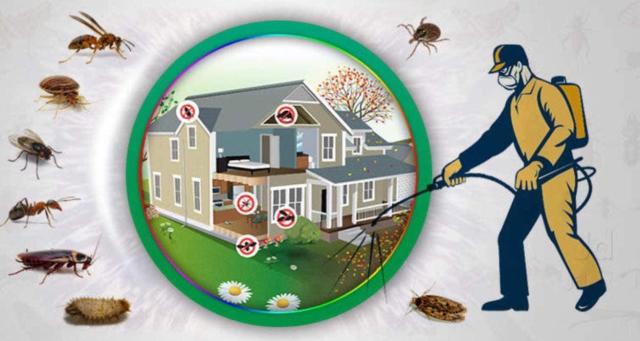Expert Pest Control Auckland: Trusted Solutions for Your Satisfaction
Expert Pest Control Auckland: Trusted Solutions for Your Satisfaction
Blog Article
Understanding Various Kinds of Insect Control Approaches and Their Efficiency
The administration of bugs is a vital element of keeping the wellness and honesty of various settings, from farming areas to household homes. When considering parasite control approaches, it is vital to comprehend the varied techniques offered and their differing levels of performance. From chemical interventions to organic options, each method presents one-of-a-kind benefits and constraints. By checking out the subtleties of these parasite control methods, an extensive understanding of just how to attend to parasite issues can be created.
Chemical Bug Control Methods
Chemical parasite control approaches play a critical role in effectively handling and removing pest problems in various settings. These techniques include using chemical compounds to remove or deter bugs such as weeds, rats, and pests. Among the essential advantages of chemical pest control is its capacity to provide fast and targeted remedies to pest issues. By utilizing details chemicals that are designed to target particular bugs, this approach can help protect against damage to crops, structures, and human wellness.
Nevertheless, it is important to take into consideration the possible risks and disadvantages linked with chemical parasite control methods. Overreliance on chemicals can cause the advancement of pesticide resistance in pests, making them harder to manage in the future. Furthermore, using particular chemicals can have dangerous impacts on non-target organisms, the atmosphere, and human health otherwise applied properly.

Organic Bug Control Methods
Using all-natural killers and microorganisms to handle bug populaces successfully, biological bug control methods supply a sustainable and eco-friendly technique to pest management. By promoting the activity or presenting of microorganisms that naturally exploit or contaminate parasites, such as ladybugs for aphid control or particular germs for caterpillar invasions, organic control can aid keep bug populaces at manageable degrees without the demand for synthetic chemicals. This approach is specifically helpful for chemical-free farming techniques, as it prevents making use of possibly harmful materials while preserving crop health.

Physical Insect Control Approaches
While biological bug control approaches concentrate on harnessing natural killers and virus, physical insect control techniques utilize mechanical and physical barriers to handle parasite populations. These techniques are typically thought about eco-friendly as they decrease using useful link chemicals. Physical bug control includes techniques such as trapping, making use of barriers like nets or displays, and physically getting rid of insects from the area.
Catches are generally used in physical insect control to capture and remove parasites like bugs and rodents. One more physical method is the use of barriers such as displays, nets, or fences to stop bugs from going into or infesting particular locations.
All-natural Insect Control Methods
Including natural predators and plant-based repellents is a crucial method in implementing efficient all-natural pest control techniques. By motivating the visibility of beneficial insects like ladybugs, lacewings, or predacious mites, gardeners can normally manage pest populaces. These killers prey on typical garden pests such as aphids, caterpillars, and mites, helping to maintain a well balanced environment without the need for chemical interventions.

Moreover, implementing social practices such as plant rotation, friend planting, and preserving appropriate plant wellness can likewise enhance the efficiency of useful reference all-natural parasite control methods. These techniques not just help in stopping bug problems but also advertise biodiversity and total ecological community resilience. By incorporating these natural approaches, individuals can properly manage bugs while lessening environmental impact.
Integrated Bug Monitoring (IPM) Approach
Executing an Integrated Parasite Monitoring (IPM) approach is crucial for successfully controlling insect populations while lessening dependence on chemical pesticides. IPM is a sustainable and thorough method that combines different parasite control techniques to attain long-lasting services. This strategy concentrates on control, avoidance, and surveillance to deal with pest problems in an ecologically friendly way.
IPM incorporates biological, social, physical, and mechanical techniques with the strategic and minimal use chemicals when necessary. By stressing aggressive procedures such as habitat adjustment, organic control, and exemption, IPM aims to decrease parasite populaces and their effect on the ecosystem. Routine surveillance is critical in IPM to assess parasite levels properly and identify one of the most suitable control methods.
One of the vital benefits of IPM is its capability to reduce the threats connected with too much chemical use, such as environmental contamination and harm to non-target microorganisms. Additionally, IPM advertises a much more alternative method to pest management by thinking about the general community characteristics. In general, the IPM approach offers a effective and sustainable service for parasite control while advertising ecological responsibility.
Verdict
In verdict, comprehending the different kinds of insect control methods and their efficiency is critical in effectively taking care of pest infestations. Integrated Insect Monitoring (IPM) method, which incorporates various methods for sustainable pest control, is increasingly being acknowledged as a alternative and ecologically friendly remedy.
Chemical insect control methods play a pivotal role in properly managing and eliminating pest infestations in various environments.Making use of all-natural killers and microorganisms to take care of bug populaces effectively, biological bug control approaches provide a environmentally friendly and sustainable strategy to pest management. By advertising the task or introducing of organisms that normally prey on or infect pests, such as ladybugs for aphid control or certain germs for caterpillar infestations, biological control can help maintain pest populations at convenient degrees without the requirement for artificial chemicals.While biological insect control techniques focus on using all-natural predators and microorganisms, physical parasite control approaches make use of physical and mechanical obstacles to take care click here to find out more of parasite populations. Integrated Insect Management (IPM) strategy, which integrates different techniques for sustainable parasite control, is significantly being acknowledged as a alternative and ecologically pleasant solution.
Report this page